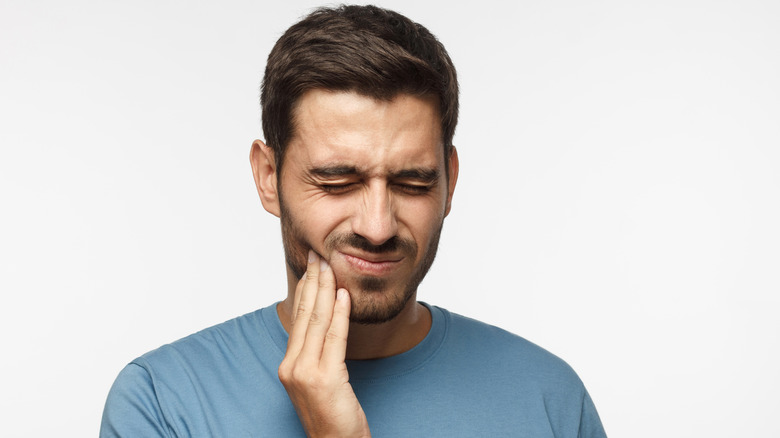What Your Jaw Ache Really Means
Aches and pains in your jaw can be uncomfortable and affect your ability to do basic tasks like eating, drinking, and speaking (via Healthline). A number of factors may cause jaw pain, including problems with your sinuses, ears, teeth, and the jaw itself. The most common reason for jaw pain is a condition called temporomandibular joint dysfunction, or TMD, sometimes also called TMJ.
The temporomandibular joints are on both sides of your face and connect the jawbone to the skull (via Mayo Clinic). Disorders of these joints can lead to pain and tenderness in the jaw, as well as a clicking sound when you chew or open your mouth. Causes of TMJ include injury or trauma to the jaw joint, a displaced disc, arthritis, grinding your teeth, and involuntary clenching of the jaw when experiencing stress or anxiety. Other reasons your jaw aches may include cluster headaches, a tooth infection, a sinus infection, nerve issues, and a heart attack.
How to treat jaw aches
For immediate relief from jaw pain, you can take an over-the-counter pain reliever like ibuprofen or acetaminophen (via Healthline). You can also apply an ice pack or a warm washcloth over the affected area (10 minutes on and 10 minutes off) to relax those aching muscles. Gently massaging the joints in your jaw in a circular motion may also help to relieve the discomfort.
If jaw pain is caused by clenching from stress, incorporating stress management techniques into your routine can help. These include yoga, meditation. If jaw pain is persistent you may want to avoid caffeine, which can increase muscle tension, and foods that are tough or chewy like apples and chewing gum. If you still have jaw pain despite these changes, your dentist may recommend medical interventions like a mouthguard, muscle relaxers, or Botox injections. In very rare cases, jaw surgery may be needed.


